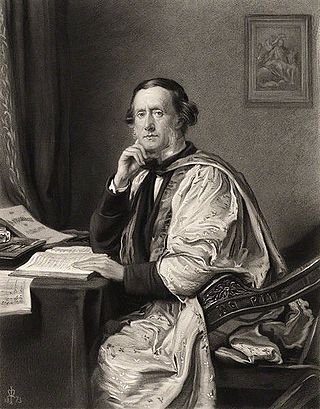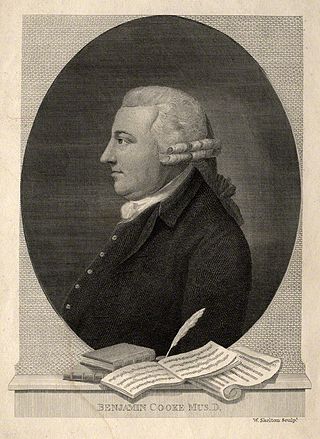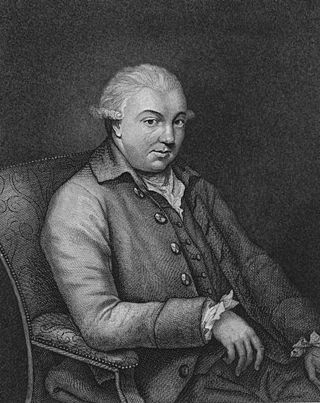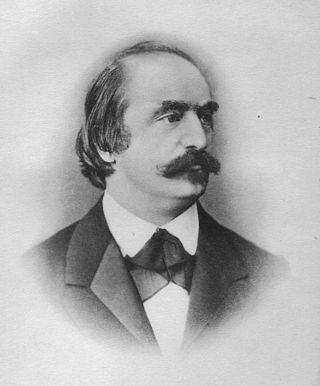Related Research Articles

Sir William Sterndale Bennett was an English composer, pianist, conductor and music educator. At the age of ten Bennett was admitted to the London Royal Academy of Music (RAM), where he remained for ten years. By the age of twenty, he had begun to make a reputation as a concert pianist, and his compositions received high praise. Among those impressed by Bennett was the German composer Felix Mendelssohn, who invited him to Leipzig. There Bennett became friendly with Robert Schumann, who shared Mendelssohn's admiration for his compositions. Bennett spent three winters composing and performing in Leipzig.
John Brown was an English Anglican priest, playwright and essayist.

"The Anacreontic Song", also known by its incipit "To Anacreon in Heaven", was the official song of the Anacreontic Society, an 18th-century gentlemen's club of amateur musicians in London. Composed by John Stafford Smith, the tune was later used by several writers as a setting for their patriotic lyrics. These included two songs by Francis Scott Key, most famously his poem "Defence of Fort McHenry". The combination of Key's poem and Smith's composition became known as "The Star-Spangled Banner", which was adopted as the national anthem of the United States of America in 1931.
A glee is a type of English part song composed during the Late Baroque, Classical, and early Romantic periods. The respectable and artistic character of glees contrasts with the bawdiness of the many catches which continued to be composed and sung well into the early years of the 19th century.

Benjamin Cooke was an English composer, organist and teacher.

Thomas Alexander Erskine, 6th Earl of Kellie, styled Viscount Fentoun and Lord Pittenweem until 1756, was a Scottish musician and composer whose considerable talent brought him international fame and his rakish habits notoriety, but nowadays is little known. Recent recordings of his surviving compositions have led to him being re-evaluated as one of the most important British composers of the 18th century, as well as a leading exponent of Scotland's music.

The New Grove Dictionary of Opera is an encyclopedia of opera. It is the largest work on opera in English, and in its printed form, amounts to 5,448 pages in four volumes.
In music, a catch is a type of round or canon at the unison. That is, it is a musical composition in which two or more voices repeatedly sing the same melody, beginning at different times. Generally catches have a secular theme, though many collections included devotional rounds and canons.

The Oxford Companion to Music defines music criticism as "the intellectual activity of formulating judgments on the value and degree of excellence of individual works of music, or whole groups or genres". In this sense, it is a branch of musical aesthetics.
Edward Garrard Marsh (1783–1862) was an English poet and Anglican clergyman.
A part song, part-song or partsong is a form of choral music that consists of a song to a secular or non-liturgical sacred text, written or arranged for several vocal parts. Part songs are commonly sung by an SATB choir, but sometimes for an all-male or all-female ensemble. Part songs are intended to be sung a cappella, that is without accompaniment, unless an instrumental accompaniment is particularly specified.
John Bennett or Bennet, was an English organist and composer.
John Marsh was an English gentleman, composer, diarist and writer born in Netherseal, Derbyshire, England. A lawyer by training, he is known to have written more than 350 compositions, including at least 39 symphonies. While today known primarily for his music, he also had strong interest in other fields, including astronomy and philosophy, and wrote books about astronomy, music, religion, and geometry.
The Hibernian Catch Club is a dining and catch musical club founded c.1680 in Dublin, Ireland by the vicars-choral of Christ Church and St. Patrick's Cathedrals. It has been referred to as the oldest surviving musical society in Europe.
Caterina Galli was an Italian operatic mezzo-soprano. She first rose to fame in England in the 1740s and early 1750s where she was particularly admired for her performances in the works of George Frideric Handel. She then enjoyed success in her native country in the 1750s and 1760s, before returning to England, where she remained active as a performer up through 1797.

Stephen Paxton was an 18th-century cellist and composer.

Henry Harington M.D. (1727–1816) was an English physician, musician and author.
John Sale was an English bass singer of church music, and a singer and composer of glees.
Joseph Corfe was an English Church singer, organist, and composer.

The Academy of Ancient Music was the name of a group of elite amateur and professional musicians that flourished in London from 1726 until 1802. The group's raison d'être was to study the music of the past through the performance of it. In 1973 a new Academy of Ancient Music was established, also focussed on performing the music of the past.
References
- 1 2 Nicholas Temperley (1999). "Review: The John Marsh Journals: The Life and Times of a Gentleman Composer (1752-1828) by Brian Robins, John Marsh". Music & Letters . 80 (4): 628–629. JSTOR 54999.
- 1 2 H. Diack Johnstone (2000). "Review: The John Marsh Journals: The Life and Times of a Gentleman Composer (1752–1828) by Brian Robins". Journal of the Royal Musical Association . 125 (2): 306–314. JSTOR 250675.
- ↑ Peter Phillips (1999). "Sizeable Symphonist. Review: The John Marsh Journals: The Life and Times of a Gentleman Composer (1752–1828) by Brian Robins, John Marsh". The Musical Times . 140 (1867): 78. JSTOR 1193908.
- ↑ Rachel Cowgill (2002). "Review: The John Marsh Journals". Early Music . 30 (3): 470–471. JSTOR 519319.
- 1 2 William Weber (2009). "Review: Catch and Glee Culture in Eighteenth-Century England by Brian Robins". Journal of British Studies . 48 (1): 224–225. JSTOR 5482998.
- 1 2 Bashford, C. (1 August 2008). "Catch and Glee Culture in Eighteenth-Century England. By Brian Robins". Music & Letters . 89 (3): 411–413. doi:10.1093/ml/gcm104. JSTOR 0163002.